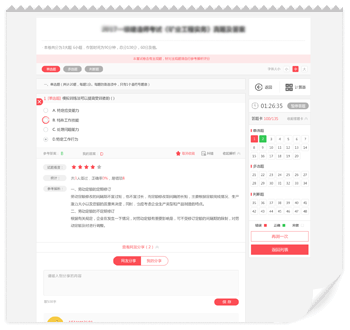- 年份:2019年
- 类型:历年真题
- 总分:100.00分
- 时长:180分钟
- 题量:48
- 做题人数:0人
做题

手机在线做题

-
材料题根据以下材料,回答1~20题
Today,we live in a world where GPS systems, digital maps, and other navigation apps are all available on our smart phones. 1 of us just walk straight into the woods without a phone.But phones 2 on batteries,and batteries can die faster than were alize. 3 you get lost without a phone or a compass, and you 4 can’t find north, a few tricks may help you navigate 5 to civilization, one of which is to follow the land.
When you find yourself well 6 a trail, but not in a completely 7 area,you have to answer two questions: Which 8 is downhill, in this particular area?
And where is the nearest water source? Humans overwhelmingly live in valleys, and on supplies of fresh water.9 ,if you head downhill, and follow any H20 you find, you should 10 see signs of people.
If you’ve explored the area before, keep an eye out for familiar sights - you may be 11 how quickly identifying a distinctive rock or tree can restore your bearings.
Another 12 : Climb high and look for signs of human habitation.13 ,even in dense forest, you should be able to 14 gaps in the tree line due to roads, train tracks, and other paths people carve 15 the woods.Head toward these 16 to find a way out.At night scan the horizon for 17 light sources, such as fires and streetlights, then walk toward the glow of light pollution.
18 , assuming you’re lost in an area humans tend to frequent, look for the 19 we leave on the landscape. Trail blazes, tire tracks, and other features can 20 you to civilization.【正确答案-参考解析】:参加考试可见
-
材料题根据以下材料,回答21-25题
Financial regulators in Britain have imposed a rather unusual rule on the bosses of big banks.Starting next year, any guaranteed bonus of top executives could be delayed 10 years if their banks are under investigation for wrongdoing.The main purpose of this “clawback” rule is to hold bankers accountable for harmful risk-taking and to restore public trust in financial institutions.Yet officials also hope for a much larger benefit: more long-term decision-making not only by banks but by all corporations,to build a stronger economy for future generations.
"Short-termism" or the desire for quick profits, has worsened in publicly traded companies,says the Bank of England’s top economist, Andrew Haldane.He quotes a giant of classical economics, Alfred Marshall, in describing this financial impatience as acting like "children who pick the plums out of their pudding to eat them at once" rather than putting them aside to be eaten last.
The average time for holding a stock in both the United States and Britain, he notes,has dropped from seven years to seven months in recent decades.Transient investors,who demand high quarterly profits from companies, can hinder a firm’s efforts to invest in long-term research or to build up customer loyalty.This has been dubbed "quarterly capitalism."
In addition, new digital technologies have allowed more rapid trading of equities, quicker use of information, and thus shorter attention spans in financial markets. "There seems to be a predominance of short-term thinking at the expense of long-term investing," said Commissioner Daniel Gallagher of the US Securities and Exchange Commission in a speech this week.
In the US, the Sarbanes-Oxley Act of 2002 has pushed most public companies to defer performance bonuses for senior executives by about a year, slightly helping reduce"short-termism." In its latest survey of CEO pay, The Wall Street Journal finds that"a substantial part" of executive pay is now tied to performance.
Much more could be done to encourage "long-termism," such as changes in the tax code and quicker disclosure of stock acquisitions.In France, shareholders who hold onto a company investment for at least two years can sometimes earn more voting rights in a company.
Within companies, the right compensation design can provide incentives for executives to think beyond their own time at the company and on behalf of all stakeholders.Britain’s new rule is a reminder to bankers that society has an interest in their performance,not just for the short term but for the long term.
【正确答案-参考解析】:参加考试可见
-
材料题根据以下材料,回答41~45题
A.These tools can help you win every argument —not in the unhelpful sense of beating your opponents but in the better sense of learning about the issues that divide people Learning why they disagree with us and learning to talk and work together with them.If we readjust our view of arguments —from a verbal fight or tennis game to a reasoned exchange through which we all gain mutual respect, and understanding —then we change the very nature of what it means to "win" an argument.
B.Of course, many discussions are not so successful.Still, we need to be careful not to accuse opponents of bad arguments too quickly.We need to learn how to evaluate them properly.A large part of evaluation is calling out bad arguments,but we also need to admit good arguments by opponents and to apply the same critical standards to ourselves.Humility requires you to recognize weaknesses in your own arguments and sometimes also to accept reasons on the opposite side.
C.None of these will be easy, but you can start even if others refuse to.Next time you state your position, formulate an argument for what you claim and honestly ask yourself whether your argument is any good.Next time you talk with someone who takes a stand, ask them to give you a reason for their view.Spell out their argument fully and charitably.Assess its strength impartially.Raise objections and listen carefully to their replies.
D.Carnegie would be right if arguments were fights, which is how we often think of them.Like physical fights, verbal fights can leave both sides bloodied.Even when you win, you end up no better off.Your prospects would be almost as dismal if arguments were even just competitions - like, say, tennis games.Pairs of opponents hit the ball back and forth until one winner emerges from all who entered.Everybody else loses.This kind of thinking is why so many people try to avoid arguments,especially about politics and religion.
E.In his 1936 work How to Win Friends and Influence People, Dale Carnegie wrote: "There is only one way...to get the best of an argument - and that is to avoid it." This aversion to arguments is common, but it depends on a mistaken view of arguments that causes profound problems for our personal and social lives - and in many ways misses the point of arguing in the first place.
F.These views of arguments also undermine reason.If you see a conversation as a fight or competition,you can win by cheating as long as you don’t get caught. You will be happy to convince people with bad arguments.You can call their views stupid, or joke about how ignorant they are.None of these tricks will help you understand them,their positions or the issues that divide you, but they can help you win in one way.
G.There is a better way to win arguments.Imagine that you favor increasing the minimum wage in our state, and I do not.If you yell, "Yes," and I yell, "No," neither of us learns anything.We neither understand nor respect each other, and we have no basis for compromise or cooperation.In contrast, suppose you give a reasonable argument:that full-time workers should not have to live in poverty.Then I counter with another reasonable argument: that a higher minimum wage will force businesses to employ fewer people for less time.Now we can understand each other’s positions and recognize our shared values, since we both care about needy workers.
【正确答案-参考解析】:参加考试可见
-
请将材料中划线的句子翻译成46~50中文:
It was only after I started to write a weekly column about the medical journals,and began to read scientific papers from beginning to end, that I realized just how bad much of the medical literature frequently was.I came to recognise various signs of a bad paper: the kind of paper that purports to show that people who eat more than one kilo of broccoli a week were 1.17 times more likely than those who eat less to suffer late in life from pernicious anaemia.(46) There is a great deal of this kind of nonsense in the medical journals which, when taken up by broadcasters and the lay press,generates both health scares and short-lived dietary enthusiasms.
Why is so much bad science published? A recent paper, titled "The Natural Selection of Bad Science", published on the Royal Society’s open science website, attempts to answer this intriguing and important question.It says that the problem is not merely that people do bad science, but that our current system of career advancement positively encourages it. They quote an anonymous researcher who said pithily : "poor methods get results ". What is important is not truth, but publication,which has become almost an end in itself.There has been a kind of inflationary process at work: (47) Nowadays anyone applying for a research post has to have published twice the number of papers that would have been required for the same post only 10 years ago.Never mind the quality, then, count the number.
(48) Attempts have been made to curb this tendency, for example, by trying to incorporate some measure of quality as well as quantity into the assessment of an applicant’s papers.This is the famed citation index, that is to say the number of times a paper has been quoted elsewhere in the scientific literature, the assumption being that an important paper will be cited more often than one of small account.(49) This would be reasonable if it were not for the fact that scientists can easily arrange to cite themselves in their future publications, or get associates to do so for them in return for similar favours.
Boiling down an individual’s output to simple metrics, such as number of publications or journal impacts, entails considerable savings in time, energy and ambiguity.Unfortunately,the long-term costs of using simple quantitative metrics to assess researcher merit are likely to be quite great.(50) If we are serious about ensuring that our science is both meaningful and reproducible, we must ensure that our institutions encourage that kind of science.
【正确答案-参考解析】:参加考试可见
-
Directions:
Suppose you are working for the "Aiding Rural Primary School" project of your university.Write an email to answer the inquiry from an international student volunteer,specifying the details of the project.
You should write about 100 words on the ANSWER SHEET.
Do not use your own name in the email.Use "Li Ming" instead.(10 points)
【正确答案-参考解析】:参加考试可见
-
Directions:
Write an essay of 160-200 words based on the picture below.In your essay, you should
1 )describe the picture briefly,
2)interpret the implied meaning, and
3)give your comments.
You should write neatly on the ANSWER SHEET.(20 points)
【正确答案-参考解析】:参加考试可见

 切换考试
切换考试
